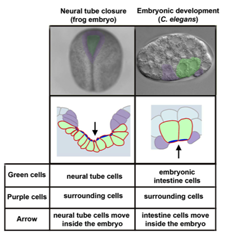Research Interests
The neural tube is an embryonic structure that forms during early stages of development giving rise to the brain and spinal cord. Neural tube defects refer to a failure of the neural tube to form properly. Neural tube defects, like spina bifida, are serious conditions, typically resulting in life-long disabilities.
Current projects include studying the roles of folic acid metabolism genes during early embryonic development. Folic acid fortification and supplementation are widely recognized to decrease the risk of neural tube defects. Folic acid or folate, is an essential nutrient found in fruit and vegetables, particularity leafy green vegetables. Intake of folate is reliant on either diet or nutritional supplementation (ie. vitamins). It is estimated that since the folic acid fortification of cereal grain food products, the incidence of neural tube defects have decreased significantly. Despite this progress, the roles of folic acid during neural tube closure and, in general, early development remain poorly understood.
We are interested in using simple model systems to study the genetic and environmental contributions to neural tube defects. Student research projects including using the worm C. elegans to study how mutations in folic acid metabolism genes affect embryonic development. We are also using the frog, Xenopus laevis to study neural tube closure in a vertebrate model system. Current projects include determining if the expression of folic acid metabolism genes are enriched in the neural tube.

